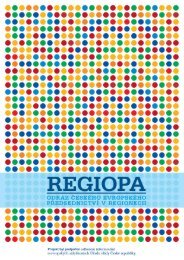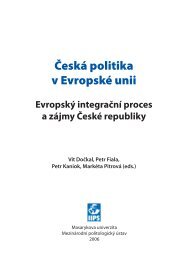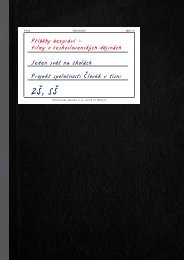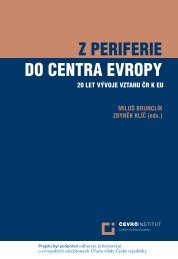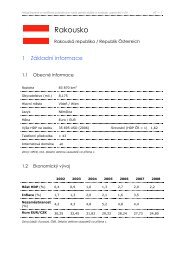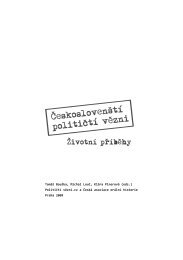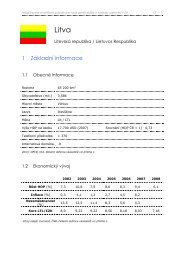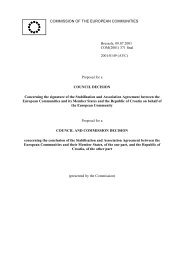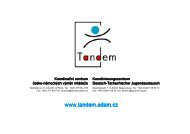CESTA KE SVOBODÄ PÅÃBÄHY BEZPRÃVÃ - Euroskop.cz
CESTA KE SVOBODÄ PÅÃBÄHY BEZPRÃVÃ - Euroskop.cz
CESTA KE SVOBODÄ PÅÃBÄHY BEZPRÃVÃ - Euroskop.cz
- No tags were found...
You also want an ePaper? Increase the reach of your titles
YUMPU automatically turns print PDFs into web optimized ePapers that Google loves.
three and a half years in jail. Despite his long imprisonment, he later signed Charter 77and in 1978 became a founding member of the Výbor na obranu nespravedlivě stíhaných –VONS (“Committee for the Defence of the Unjustly Persecuted”).The first five or six years following the occupation were to prove crucial in shapinganti-communist opposition in the 1970s. First and foremost, it became apparent duringthese years that society would not be ruled by mass terror as it was after February 1948.No labour camps and jails full of thousands of victims of political trials would be reestablished.No widespread reign of terror would be launched. Instead, people would “only”be subjected to daily harassment and a systematic network of informers. Anyone who didnot stand out and who went along with the majority in an orderly manner (i.e. anyonewho accepted the situation) could live in peace and would essentially have enough toget by. On the other hand, anyone who made trouble (by complaining or criticising theconditions in which they had to live) would lose their job. Their children would not beable to study and their lives would be made more difficult, etc. Anyone who rebelled andopenly opposed the government could expect even bigger trouble, beginning with policeinterrogations and ending with a prison sentence.Logically, the milieu that was most likely to produce (and which ultimately did give riseto) hardcore opposition also changed. It was no longer possible to expect the regime to beundermined by the army or ordinary people affected by communism because of their classorigin. Instead, this was much more likely to come from the ranks of intellectuals andartists whose involvement in public activism had been the most visible during the 1960s.Charter 77Charter 77 was the largest opposition initiative of the normalisation era and it waspreceded by the trials of musicians from the underground rock band The Plastic People ofthe Universe in 1976. At the time, a diverse group of people came to the musicians’ defence,ranging from members of both the Catholic and Evangelical faiths to banned liberaland socialist-leaning artists and intellectuals as well as former reformist communists(including ex-communist politicians). This initiative showed that it was possible to defendhuman rights on the basis of international treaties on “civil and political rights” as well ason “economic, social and cultural rights”, which the Czechoslovak Socialist Republic hadsigned up to and which were published in the statute books in 1976. In December of thesame year, 242 citizens signed the Charter 77 proclamation, which stated that the rightsand freedoms guaranteed by international agreements should not only exist on paper inthe country but should actually be implemented. The Charter declaration was dated 1January 1977 and its signatories described themselves as an “informal and open associationof people” defending human rights “in our country and throughout the world”.The Charter group issued numerous statements. It became the most important oppositionplatform throughout the entire period that followed and it remained so right up to the fallof communism. Essentially, all other dissident activities were connected with it in someway. At the same time, however, many opponents of communism from the normalisationera did not sign Charter 77 for ideological reasons. For example, some of them hadreservations about its demand to enter into dialogue with the regime. Dissidents whowere “non-signatories” included people who for many years had been involved in samizdatpublishing activities, independent initiatives or in organising seminars and discussionsin people’s homes. The Charter was also not signed by many dissidents from the “youngergeneration”, simply because they did not deem it necessary in the 1980s.The Committee for the Defence of the UnjustlyPersecuted and other civic initiatives, samizdatActive opposition to the totalitarian regime manifested itself in a number of areas duringthe 1970s and 80s. One of the most important initiatives was undoubtedly the Výbor naobranu nespravedlivě stíhaných – VONS (“Committee for the Defence of the UnjustlyPersecuted”). From 1978 onwards, its members systematically mapped police and judicialabuses. They also ensured that the free world was given detailed information on conditionsin communist Czechoslovakia and on individual cases of injustice. They were “rewarded”with long prison terms for their activities.Anti-regime activities, however, did not simply focus on defending human rights. Severaldozen series of samizdat publications were issued. This ensured that texts written withoutsupervision or which were “ideologically inappropriate” were distributed in addition toofficially sanctioned literature that had been passed by the censor. Opposition spread inChurch circles and seminars were held in people’s homes. Unauthorised concerts wereorganised, and the Jazzová sekce Svazu hudebníků ČSR (Jazz Section of the Czechoslovakmusicians’ union) also developed and extended is activity. The Jazz Section is a goodexample of the multifaceted nature of opposition to totalitarianism. It was established in1971 and organised cultural events, including the well-known Prague Jazz Days festival. Atthe start of the 1980s, it primarily devoted itself to publishing activities, issuing severalbulletins and magazines, editions of art monographs, literature etc. It had around 7,000members by the mid-1980s. It was not an openly dissident organisation, but it “defiedsupervision” and the regime repeatedly used police pressure and administrative measuresto try and disband it. The harassment of the group’s most active members culminated inthe arrest of its administrators in 1986.A large number of independent initiatives appeared in the second half of the 1980s. Groupswho were established at this time included České děti (“Czech Children”), the Hnutí zaobčanskou svobodu (“Movement for Civic Freedom”), the Český helsinský výbor (“CzechHelsinki Committee”), Polsko-československá solidarita (“Polish-Czechoslovak Solidarity”),the Mírový klub Johna Lennona (“The John Lennon Peace Club”), the Demokratickáiniciativa (“Democratic Initiative”), Pražské matky (“Prague Mothers”) and the Společnostza veselejší současnost (“Society for a More Cheerful Present”). Some initiatives werecompletely serious political associations while others were more like a subversive prank.Moreover, opponents of communist normalisation were often simultaneously involved ina number of different fields. Independent initiatives, Church resistance, the monitoringof police and judicial persecution as well as samizdat publishing often all overlappedin the work of various individuals. For example, the Ostrava writer Jaromír Šavrda wassystematically harassed and twice imprisoned for producing books on a typewriter at home.He became a signatory to Charter 77 after returning from his first jail sentence. His health42 | 43



